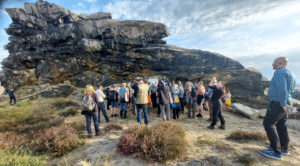Call for projects
INQUA financial support is provided to stimulate the development of research networks, and is divided into two categories:
INQUA funding for International Research Network (IRN):
- Multi-year IRN (1 workshop/year) – applications for multi-year IRN are accepted only at the start of the inter-congress period, which is the year of the INQUA Congress, 2027 – Applications CLOSED!
- Single-year IRN (1 stand-alone meeting/conference) – Applications OPEN!
INQUA funding for International Skill Activity (ISA):
- Single-year ISA (1 workshop) – Applications OPEN!
Definitions
For the purposes of all funding schemes, the Executive uses the following definitions:
Early Career Researchers (ECRs)
For the purposes of funding, INQUA defines early-career researchers as graduate students and postgraduates within 8 years of receiving their final degree. This period of 8 years does not take into account periods of time taken not working as an academic or because of taking time off because of family responsibilities. Scientists who have been working for less than 8 years and who have permanent (tenured) positions, may still be considered as early-career researchers.
Developing-country scientists
For the purposes of funding, INQUA defines Developing-Country Researchers (DCR) – as those who are working in low income or lower middle income economies (see here for list of these economies). DCRs may, but do not necessarily have to, come from countries that are Members or affiliates of INQUA. In applying this guideline, INQUA will take into account that inclusion or exclusion from the OCSE list may not be an adequate reflection of the levels of science funding or funding to individual scientists. In particular, more senior scientists from low/lower middle income economies may still have sufficient levels of funding to enable them to participate in INQUA projects – applicants are asked to be sensitive to this issue when applying for funding, in order to ensure that funding goes to people who would most benefit from support. Please contact the President of the relevant Commission with any queries in relation to this.
2026 IRN/ISA Project Call Results
CMP
OnSea – EvolutiOn of Seascapes, PI Gaia Mattei, Parthenope University of Naples, Naples, Italy
PALSEA-next – PALeo constraints on SEA level, PI Juliet Sefton, Department of Earth Sciences, University of Pisa, Italy
CoreToCode – From Cores to Code: using Quaternary geology to forecast coastal change, PI Annie Lau, School of the Environment, University of Queensland, Australia
HABCOM
PalaeoHome – Palaeolithic Hominins and Habitats: Out of Africa to South Asia, PI Kumar Akhilesh, Sharma Centre for Heritage, India
PalCoproSA – Integrating tools for investigating paleoecosystems through multiproxy analysis of coprolites, PI Velázquez Nadia Jimena, Consejo Nacional de investigaciones científicas y técnicas (CONICET)
ABRAQUAS – Advancing Brazilian Quaternary Science: Crossing Frontiers through Interdisciplinary Research, PI Thaís Rabito Pansani, Universidade do Estado do Rio de Janeiro, Brazil
CLIMPEOP-SSA – Workshop on the Impact of Holocene climate and environmental change on the peopling of southern South America, PI Sebastien Bertrand, GEOPS, Paris-Saclay University, France
PALCOM
WiSH – Warm Intervals in the Southern Hemisphere, PI Jasper Knight, S Africa
INTIMATE – INTegrating Ice core, Marine and TErrestrial records for advanced palaeoclimate reconstruction, PI Celia Martin Puertas, UK
Sirocco – Quaternary far-travelled dust contributions to Mediterranean landscapes, PI Kathryn Fitzsimmons, Monash University, Australia
ICYS – Ice Core Young Scientists Workshop, PI Romilly Harris Stuart
TERPRO
CHAMP – Cascading Hazards and Mitigation Project, PI Tina Niemi, University of Missouri-Kansas City, USA
PHADMA – Palaeo-Hydrology: Ancient disasters, modern application, PI Willem Toonen, Netherlands
PWGM2026 – International Field Symposium Glacials and interglacials of the Middle and Upper Pleistocene in central Poland, PI Małgorzata Frydrych University of Lodz, Poland
PaleoNiger – Quaternary evolution of the Niger River Upper Valley with insights into paleoenvironmental reconstruction, neotectonics, placer deposits development and human settlements, PI N’dji dit Jacques Dembele, Université des Sciences Sociales et de Gestion de Bamako, Mali
INQUA-CODE – Programming and Numerical Modelling Skills for Early Career Researchers in Quaternary, PI Suryodoy Ghoshal, University of Plymouth, UK
FIWP-PALENQUE – Field International Workshop on Paleopedology: Deciphering the ancient anthropic landscape transformation in the southern Maya lowlands in Mexico, PI Elizabeth Solleiro-Rebolledo, Institute of Geology, Mexico City
LAND-CASCADES – Lanslide Dynamics and Cascading Hazards in the Andes, PI Stella Moreiras, Argentina
QUASEE – Quaternary Sediments as Archives of Extreme Events, PI Corina Campos, Universidad Regional Amazónica, Ecuador
SACCOM
EQ – European Correlation of Quaternary Stages Boundaries, PI Markus Fiebig, Austria
EEIW – The 20th East Eurasia International Workshop on Present Earth Surface Processes and Long term Environmental Changes in East Eurasia, PI Sergei Krivonogov, Southwest Jiaotong University, China
2025 IRN/ISA Project Call Results
CMP
WHoRLS – Workshop on Holocene relative sea-level change in the Southern Hemisphere, P.I. Ed Garrett, Department of Environment and Geography, University of York, York, UK
HABCOM
PyPEN-REP – The Paraguay Past Ecology Network – Red de la Ecología del Pasado de Paraguay, P.I. Oliver Wilson, Department of Environment and Geography, University of York, UK
PALCOM
TRAC-XSA – Training Researchers in Core Analysis with Scanner XRF for South America, P.I. Denisse Álvarez, Universidad Santo Tomás, Columbia
S4 – Summer School on Speleothem Science, P.I. Yassine Ait Brahim, University Mohammed VI Polytechnic, Marroco
TERPRO
DatOI – Earthquake, Quaternary dating, Seismic Hazard, Paleoseismology, Morphotectonic, P.I. Lea Pousse Beltran, ISTerre laboratory in Université Grenoble Alpes, Grenoble, France
PAST – Palaeosoil Analysis in Late Glacial Sandy Terrains Across Europe, P.I. Lidija Galović, Croatian Geological Survey, Zagreb, Croatia





